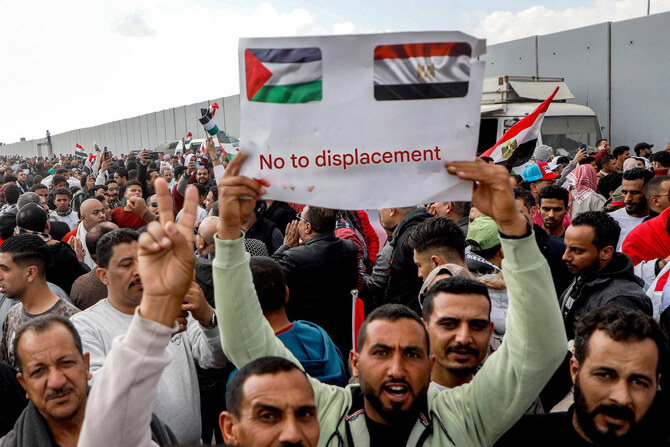LONDON: Already host to almost 10 million migrants and refugees, Egypt now faces pressure to shelter hundreds of thousands of Gazans — a move Cairo deems unfair to the Palestinians and a potential threat to its economy and security.
US President Donald Trump has suggested that some 1.5 million people from the Palestinian enclave could be relocated to Egypt and Jordan — a plan that has met with opposition from both countries’ leaderships.
“Egypt views this proposal as an unacceptable liquidation of the Palestinian cause — something that neither Egyptians, Palestinians, nor other influential regional states would accept,” Hani Nasira, an Egyptian author and academic, told Arab News.
“It undermines the two-state solution and the peace agreements with Israel, which many regional countries have tied their engagement to.”
Beyond what this might mean for the Palestinians, Nasira also cited economic concerns for Egypt, especially if Gazans are not permitted to return. “Egypt hosts more than 9 million refugees and migrants who pose an economic burden and do not live in camps,” he said.
“Rather than treating displaced people as refugees or housing them in camps, Egypt has integrated them into society and considers them ‘guests,’ as President Abdel Fattah El-Sisi has repeatedly stated.”
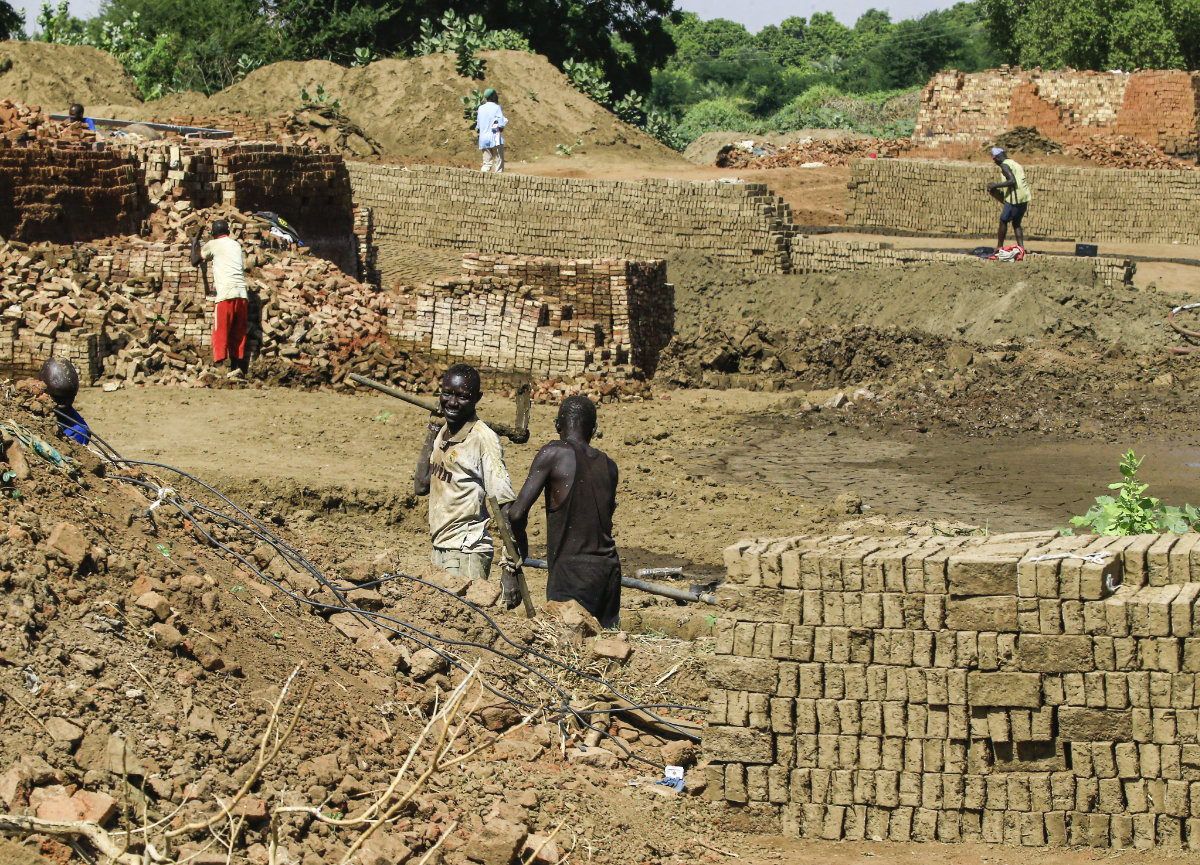
Sudanese brick makers work in an agricultural field in the capital Khartoum's district of Jureif Gharb on November 11, 2019. Egypt is home to more than 9 million foreign nationals who have fled conflict from their countries, and Egypt has integrated mnost of them into society and considers them ‘guests.’ (AFP)
Indeed, the UN refugee agency, UNHCR, has praised Egypt for its policy of placing displaced foreign nationals in host communities, “reflecting the government’s commitment to the Global Compact on Refugees’ principle of finding alternatives to camps.”
Egypt is a signatory to key international treaties defining refugee rights and state obligations, including the 1951 Refugee Convention, its 1967 Protocol, and the 1969 Organization of African Unity Convention.
While official statistics show that Egypt hosts more than 9 million refugees and asylum-seekers, only 822,701 of them were registered with the UNHCR as of October. Access to many services typically requires being registered with the UNHCR or one of its partners.
REFUGEES & MIGRANTS IN EGYPT
• 4 million+ Sudanese
• 1.5 million+ Syrians
• 1million+ Yemenis
• 1 million+ Libyans
(Source: IOM)
According to UN figures, Egypt’s registered refugees originate from 59 nations, including Sudan, Syria, South Sudan, Eritrea, Ethiopia, Yemen, Somalia, and Iraq. As of October 2023, the Sudanese nationality was the largest group, followed by Syrians.
Sudan, which borders Egypt to the south, has been trapped in a state of conflict between rival military factions since April 2023, leading to one of the world’s worst humanitarian catastrophes, displacing some 12 million people, both internally and externally.
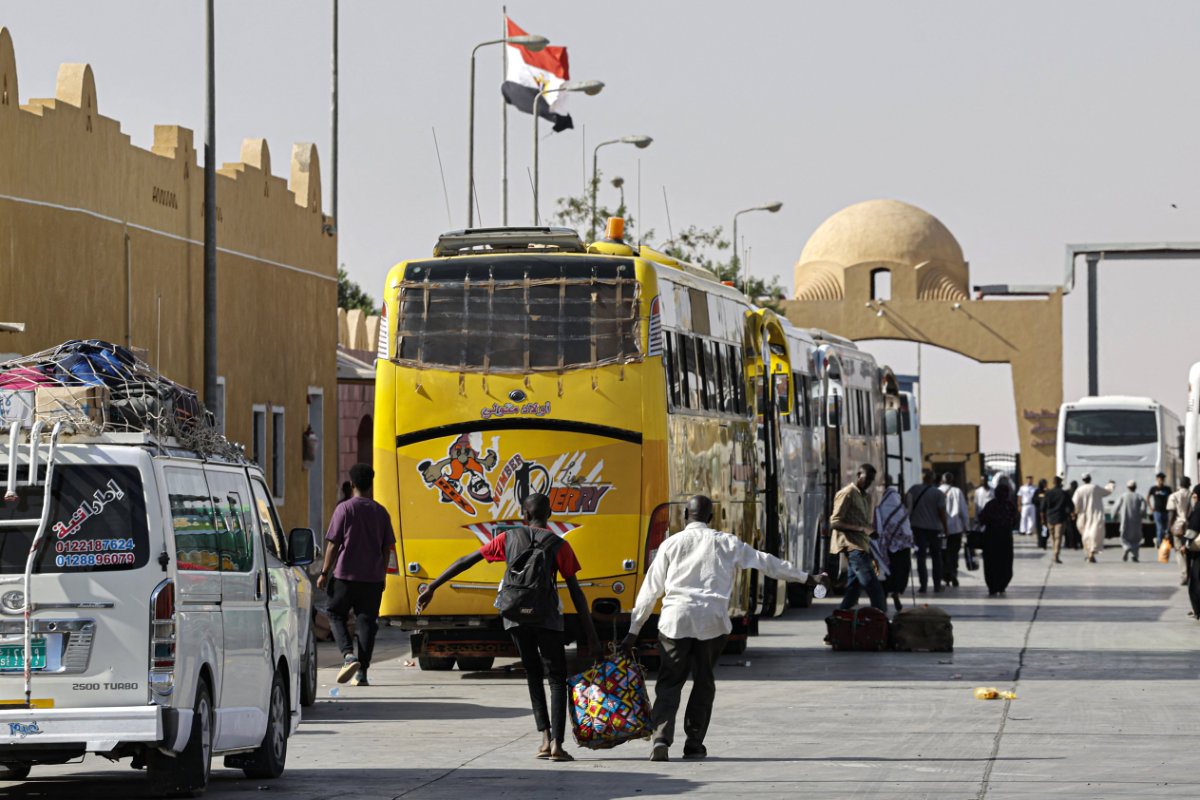
In this photo taken on May 13, 2023, Sudanese fleeing war-torn Sudan are seen arriving at Qastal land port crossing between Egypt and Sudan. (AFP)
Fighting between the Sudanese Armed Forces and the paramilitary Rapid Support Forces has devastated the capital Khartoum and other cities, shattering the nation’s health system and compounding outbreaks of once preventable diseases.
Domestic agriculture and supply chains have collapsed, leading to outbreaks of famine across the country. In Darfur and other areas, accounts of sexual violence and even genocide have emerged. Access issues and underfunding have hampered the humanitarian response.
Syria, meanwhile, has only recently emerged from more than a decade of civil war, which has displaced millions of refugees throughout the region and across the globe. Instability persists even after the toppling of the Bashar Assad regime, and swathes of the country remain in ruins.

This photo taken on January 4, 2018, shows Syrian refugees working at a restaurant in Egypt's second city of Alexandria. Egypt welcomed tens of thousands of people displaced since the Syrian civil war broke out in 2011. (AFP/File)
South Sudan and nations on the Horn of Africa have experienced some of the most extreme and least reported conflicts of recent years, including the Tigray war in Ethiopia, not to mention climate disasters including devastating floods and crippling drought.
Recent and ongoing conflicts in Libya, Yemen, and Iraq have likewise sent millions in search of safety and a route out of poverty in Egypt — already the Arab world’s most populous country — which has itself experienced instability and hardship.
Egyptian Prime Minister Mostafa Madbouly said last year that Egypt hosted 40 percent of those fleeing Sudan, 1.5 million Syrian refugees since 2012, and expected to receive more Palestinians displaced from Gaza.
Since Israel mounted its military campaign in the Gaza Strip on Oct. 7, 2023, in retaliation for the deadly Hamas-led attack on southern Israel, nearly all of the enclave’s 2.2 million residents have been displaced from their homes at least once.
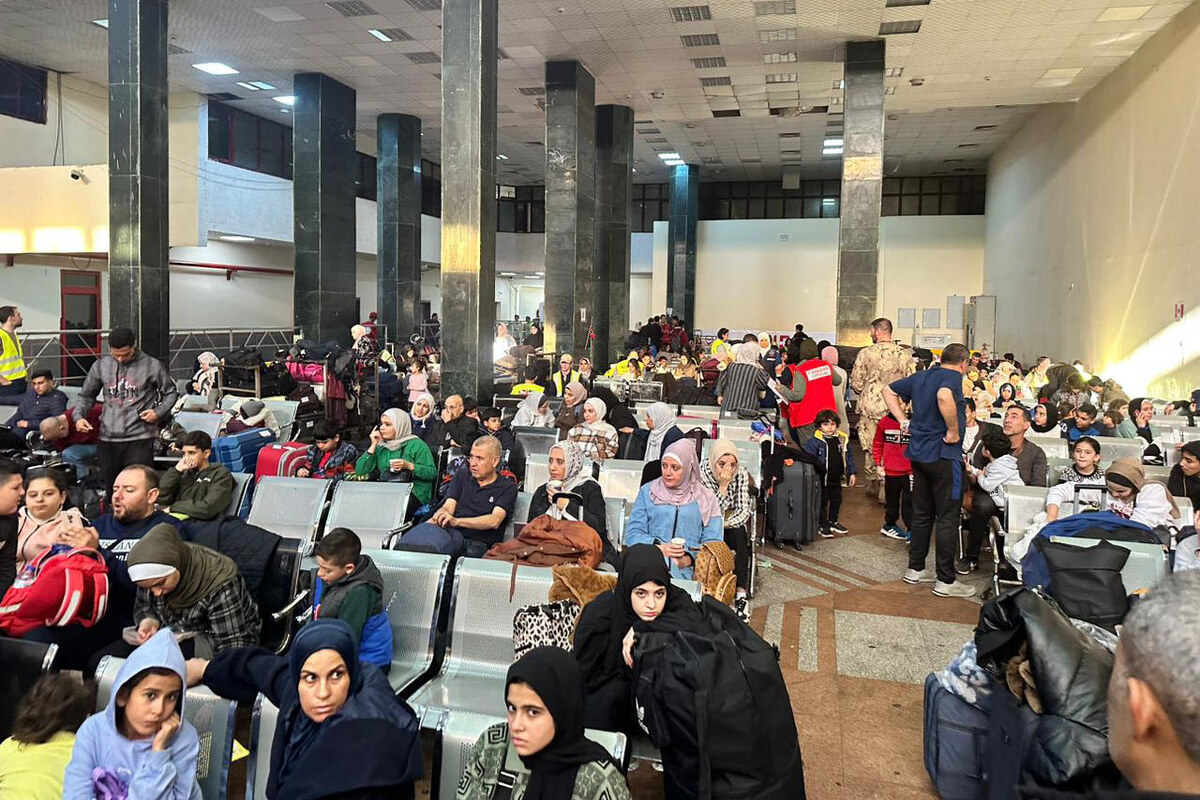
People fleeing from the Gaza Strip wait in the Egyptian part of the Rafah border crossing with the Palestinian enclave, on December 3, 2023, amid continuing battles between Israel and the militant group Hamas. (AFP)
As many as 100,000 Gazans managed to cross into Egypt before Israel captured the Rafah border crossing in May, according to Palestine’s Ambassador in Cairo Diab Al-Louh. Many lacked the documents needed to enroll children in school, open businesses, travel, or access health services.
Trump first floated the idea of relocating Gazans en masse on Jan. 25 and reiterated it the next day aboard Air Force One, saying he wanted the Palestinian enclave “just cleaned out” to start afresh after a ceasefire agreement between Israel and Hamas was announced in mid-January.
On Feb. 4, he went even further, announcing plans for a US “takeover” of the Gaza Strip during a meeting with Israeli Prime Minister Benjamin Netanyahu in Washington D.C.
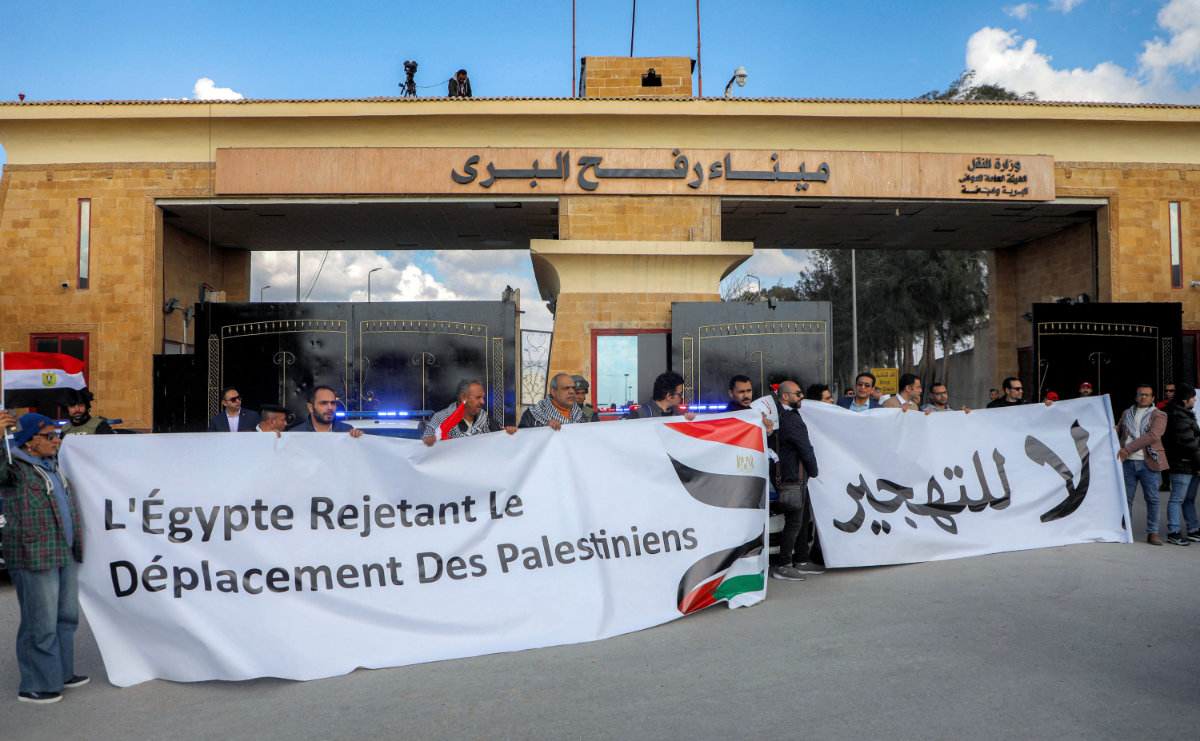
Demonstrators gather outside the Egyptian side of the Rafah border crossing with the Gaza Strip on January 31, 2025 to protest against a plan floated by US President Donald Trump to move Palestinians from the Gaza Strip to Egypt and Jordan. (AFP)
Trump said he wanted the US to take a “long-term ownership position” and turn the Eastern Mediterranean territory into the “Riviera of the Middle East.” Palestinians could be resettled away from Gaza, “in areas where the leaders currently say no,” he said.
Egyptian Foreign Minister Badr Abdelatty had already expressed concerns about the strain Egypt’s refugee burden is placing on the national budget and host communities, citing insufficient international support amid the growing number of displaced people.

During a Jan. 27 meeting with heads of three UN agencies in Geneva, Abdelatty reiterated Egypt’s call for a fairer and more sustainable distribution of responsibility, urging the UN International Organization for Migration to help manage migrant flows and strengthen Egypt’s capacity to host those it already had.
On Jan. 28, Abdelatty told the Universal Periodic Review of Human Rights in Geneva that his country has shouldered a significant responsibility on behalf of the international community by hosting 10.7 million foreign nationals, including refugees and irregular migrants.
However, he said Egypt’s “capacity to accommodate and continue our efforts is at risk, especially given the insufficient international support relative to the pressures we are facing.”
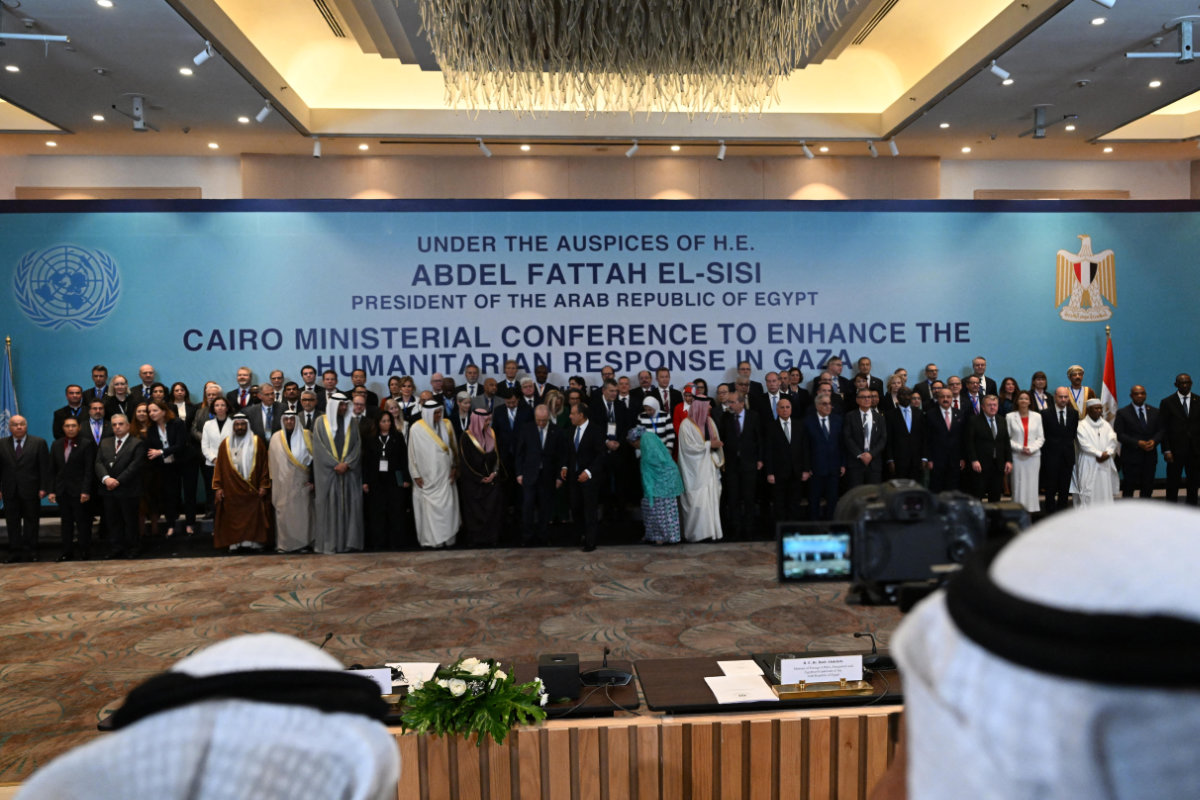
Delegates pose for a group picture during a humanitarian conference for Gaza in Cairo on December 2, 2024, amid the continuing war between Israel and Hamas. (AFP)
In April last year, Egypt’s Prime Minister Madbouly said hosting some 9 million refugees was costing his country approximately $10 billion per year, at a time when Egypt is grappling with its own economic crisis, despite receiving financial assistance from the EU, the International Monetary Fund, the World Bank, and others to help stave off collapse.
Egypt’s revenues from the Suez Canal dropped by more than 60 percent in 2024, amounting to a $7 billion loss compared to the previous year, President El-Sisi said in a December statement. The loss was primarily driven by regional tensions, including attacks on ships in the Red Sea by the Iran-backed Houthi militia in Yemen.
Egypt’s economy is also struggling with a high inflation rate, which stood at 24.1 percent in December, according to Trading Economics.
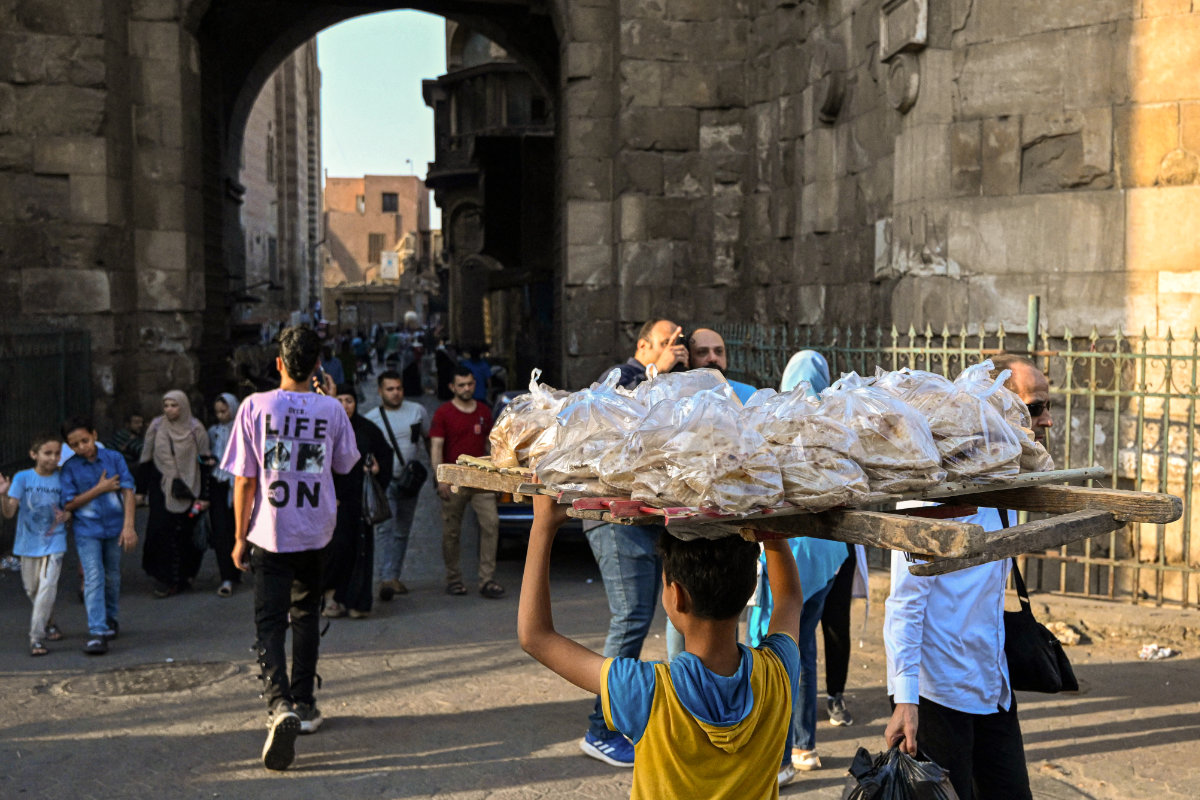
A young boy delivers freshly-baked bread in the al-Darb al-Ahmar district in the old quarters of Cairo on May 28, 2024.
Economic repercussions are not the sole concern surrounding plans to relocate Gazans to Egypt. Officials believe the move may also threaten the security of the country and the wider region.
El-Sisi told a press conference on Jan. 29 that the transfer of Palestinians “can never be tolerated or allowed because of its impact on Egyptian national security.”
Egyptian academic Nasira said that implementing Trump’s proposal “could shift the conflict onto Egyptian soil and across the Middle East.”
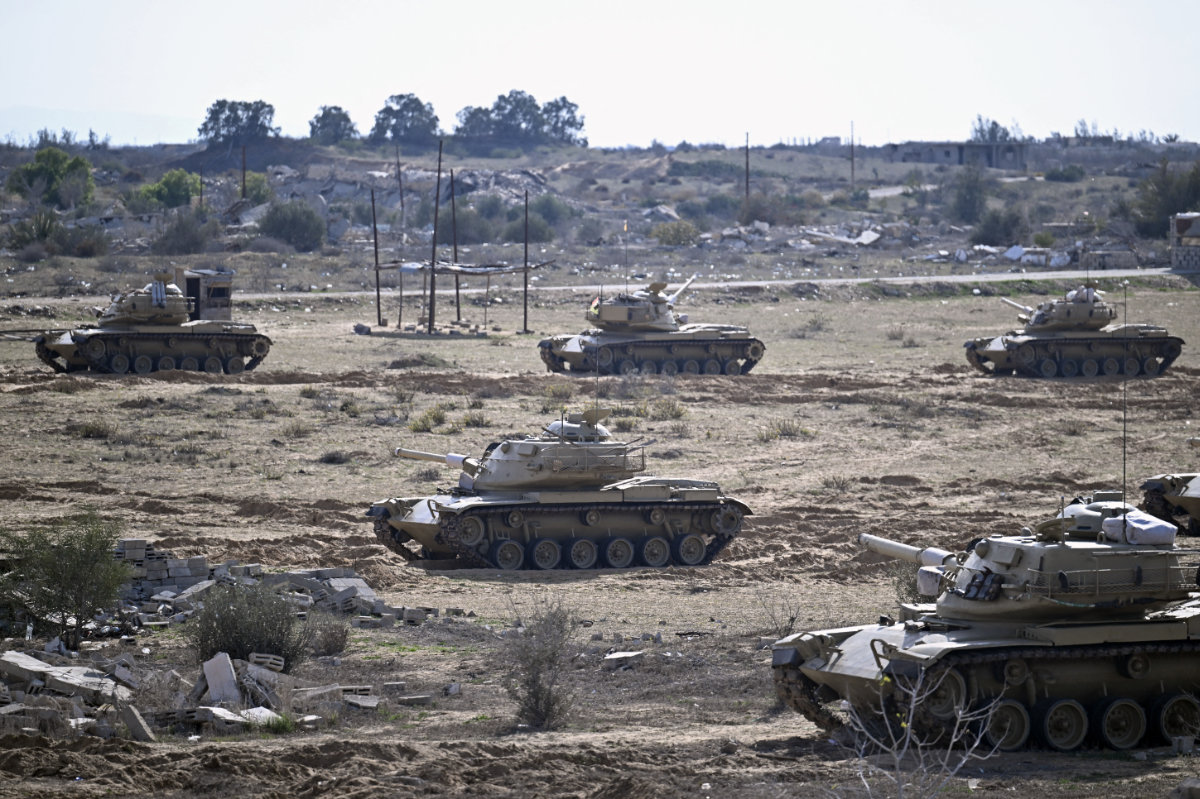
Tanks stand on guard along the Egyptian side near the Rafah border crossing with the Gaza Strip on January 19, 2025. Egyptians fear that Trump’s proposal to relocate Gazans to Egypt “could shift the conflict onto Egyptian soil and across the Middle East.” (AFP)
Two days before El-Sisi’s statement, Parliament Speaker Hanafy El-Gebaly warned that relocating Gaza’s residents “may impede efforts to maintain the current truce and reach a permanent ceasefire” and risk “transferring the conflict to other territories, with disastrous repercussions for the entire region.”
Nasira said Cairo considers the relocation a threat to its national security, “as it could destabilize the Suez Canal the Sinai Peninsula, which was contested in multiple wars, the most recent in October 1973,” and “fuel further extremism in Egypt and the broader region.”
Echoing Cairo’s concerns, several influential Arab nations, including Saudi Arabia, the UAE, and Qatar, also warned that such plans “threaten the region’s stability, risk expanding the conflict, and undermine prospects for peace and coexistence among its peoples.”
Cairo fears that relocating Palestinians from Gaza — along with Hamas and other militant groups — could unravel the Camp David Accords, brokered in 1978 by US President Jimmy Carter between Egyptian President Anwar Sadat and Israeli Prime Minister Menachem Begin.
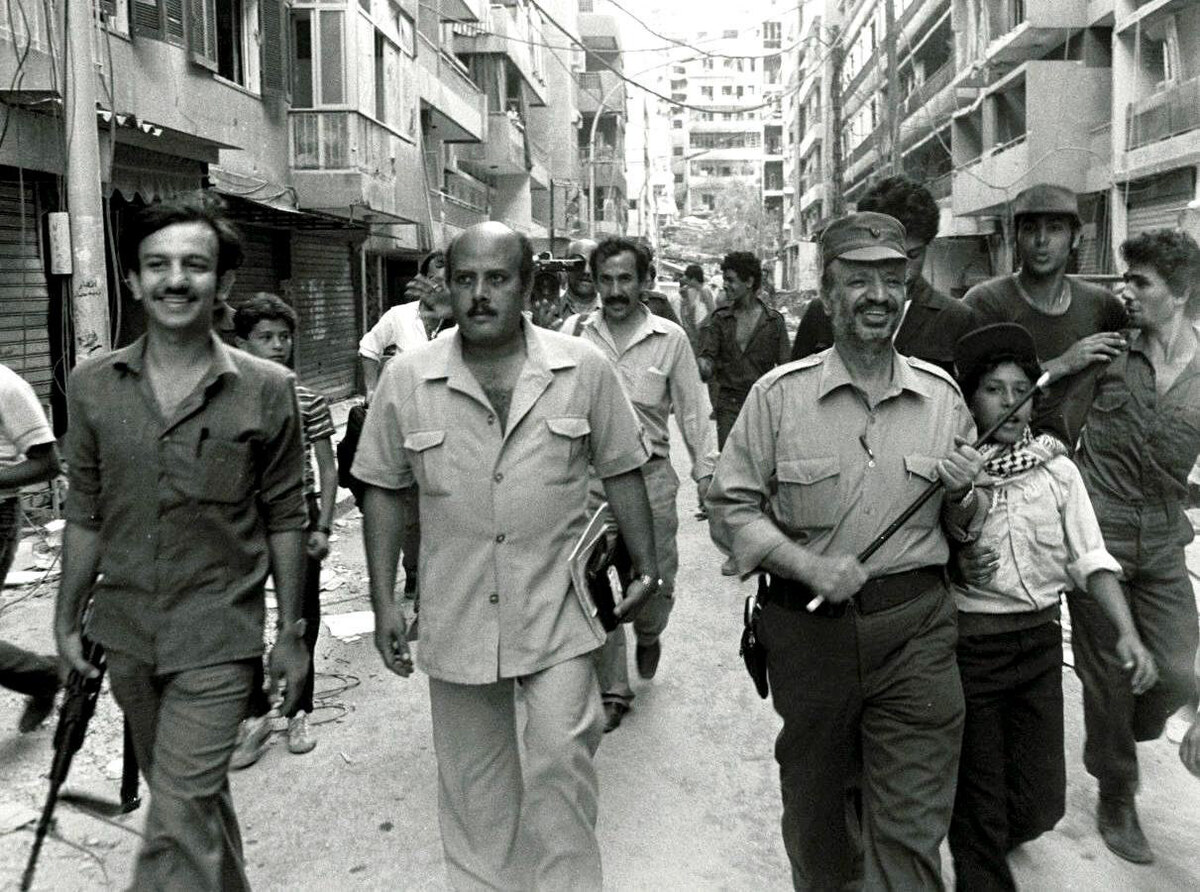
Palestinian leader Yasser Arafat (R) is seen with his supporters in Beirut during the early days of the 1982 Israeli invasion of Lebanon. (AFP)
Palestinian militant groups could ignite future wars on Egyptian territory — much like in 1970s Lebanon, when Yasser Arafat’s Palestine Liberation Organization turned the southern part of the country into a launchpad for attacks on Israel.
Shortly after the Gaza war began, El-Sisi warned a mass exodus of Palestinians into Egypt’s Sinai could wreck the 1978 peace deal, turning the region into “a base for attacks on Israel,” prompting Israel to “strike Egyptian territory.”
He said: “The peace which we have achieved would vanish from our hands. All for the sake of the idea of eliminating the Palestinian cause.”



